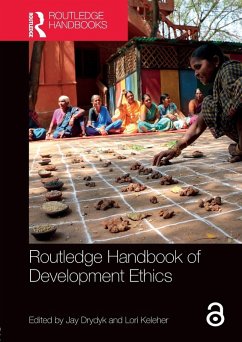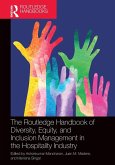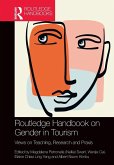Routledge Handbook of Development Ethics
Herausgeber: Drydyk, Jay; Keleher, Lori
Routledge Handbook of Development Ethics
Herausgeber: Drydyk, Jay; Keleher, Lori
- Broschiertes Buch
- Merkliste
- Auf die Merkliste
- Bewerten Bewerten
- Teilen
- Produkt teilen
- Produkterinnerung
- Produkterinnerung
The Routledge Handbook of Development Ethics provides readers with an insight into the central questions of developmet ethics, the main approaches to answering them and discusses areas for future research.
Andere Kunden interessierten sich auch für
![The Routledge Handbook of Diversity, Equity, and Inclusion Management in the Hospitality Industry The Routledge Handbook of Diversity, Equity, and Inclusion Management in the Hospitality Industry]() The Routledge Handbook of Diversity, Equity, and Inclusion Management in the Hospitality Industry62,99 €
The Routledge Handbook of Diversity, Equity, and Inclusion Management in the Hospitality Industry62,99 €![Routledge Handbook of Social Psychology of Tourism Routledge Handbook of Social Psychology of Tourism]() Routledge Handbook of Social Psychology of Tourism42,99 €
Routledge Handbook of Social Psychology of Tourism42,99 €![Routledge Handbook on Gender in Tourism Routledge Handbook on Gender in Tourism]() Routledge Handbook on Gender in Tourism63,99 €
Routledge Handbook on Gender in Tourism63,99 €![Routledge Handbook of Trends and Issues in Global Tourism Supply and Demand Routledge Handbook of Trends and Issues in Global Tourism Supply and Demand]() Routledge Handbook of Trends and Issues in Global Tourism Supply and Demand46,99 €
Routledge Handbook of Trends and Issues in Global Tourism Supply and Demand46,99 €![Routledge Handbook of Trends and Issues in Tourism Sustainability, Planning and Development, Management, and Technology Routledge Handbook of Trends and Issues in Tourism Sustainability, Planning and Development, Management, and Technology]() Routledge Handbook of Trends and Issues in Tourism Sustainability, Planning and Development, Management, and Technology46,99 €
Routledge Handbook of Trends and Issues in Tourism Sustainability, Planning and Development, Management, and Technology46,99 €![Routledge Handbook of Natural Resource Governance in Africa Routledge Handbook of Natural Resource Governance in Africa]() Routledge Handbook of Natural Resource Governance in Africa46,99 €
Routledge Handbook of Natural Resource Governance in Africa46,99 €![The Routledge Handbook of Digital Sport Management The Routledge Handbook of Digital Sport Management]() The Routledge Handbook of Digital Sport Management43,99 €
The Routledge Handbook of Digital Sport Management43,99 €-
-
-
The Routledge Handbook of Development Ethics provides readers with an insight into the central questions of developmet ethics, the main approaches to answering them and discusses areas for future research.
Produktdetails
- Produktdetails
- Verlag: Routledge
- Seitenzahl: 462
- Erscheinungstermin: 6. August 2020
- Englisch
- Abmessung: 246mm x 174mm x 25mm
- Gewicht: 816g
- ISBN-13: 9780367629458
- ISBN-10: 0367629453
- Artikelnr.: 62663619
- Herstellerkennzeichnung
- Libri GmbH
- Europaallee 1
- 36244 Bad Hersfeld
- gpsr@libri.de
- Verlag: Routledge
- Seitenzahl: 462
- Erscheinungstermin: 6. August 2020
- Englisch
- Abmessung: 246mm x 174mm x 25mm
- Gewicht: 816g
- ISBN-13: 9780367629458
- ISBN-10: 0367629453
- Artikelnr.: 62663619
- Herstellerkennzeichnung
- Libri GmbH
- Europaallee 1
- 36244 Bad Hersfeld
- gpsr@libri.de
Jay Drydyk is Professor of Philosophy at Carleton University, Ottawa, Canada, Past President of the International Development Ethics Association and Human Development and Capability Association Fellow. Lori Keleher is Associate Professor of Philosophy at New Mexico State University, USA. She serves on the board of the International Development Ethics Association, as well as on the Executive Council and as a Fellow for the Human Development and Capability Association.
1. Introduction
PART I: Contexts
2. Global ethics
3. Integral human development
4. Post-development
5. Epistemology
PART II: Well-being
6. Well-being
7. Capabilities
8. Happiness
9. Adaptive preferences
PART III: Social and global justice
10. Social and global justice
11. Gender
12. Indigenous peoples
13. 'Horizontal' inequalities
14. Children
15. Health
PART IV: Empowerment and agency
16. Empowerment
17. Agency
18. Education
19. Displacement
PART V: Environmental Sustainability
20. Sustainability and Climate Change
21. Food Production
22. Buen Vivir and the Rights of Nature
PART VI: Human rights
23. Human Rights
24. The Right to Development
25. Security
PART VII: Cultural freedom
26. Cultural Freedom
27. LGBTI People
28. Religion
PART VIII: Responsibility
29. International Responsibilities
30. Development practitioners
31. Corruption
PART IX: Regional perspectives
32. Latin America
33. South Asia
34. East Asia
35. Middle East and Northern Africa
36. French-speaking Sub-Saharan Africa
37. Sub-Saharan Africa A
38. Europe
39. USA and Canada
PART I: Contexts
2. Global ethics
3. Integral human development
4. Post-development
5. Epistemology
PART II: Well-being
6. Well-being
7. Capabilities
8. Happiness
9. Adaptive preferences
PART III: Social and global justice
10. Social and global justice
11. Gender
12. Indigenous peoples
13. 'Horizontal' inequalities
14. Children
15. Health
PART IV: Empowerment and agency
16. Empowerment
17. Agency
18. Education
19. Displacement
PART V: Environmental Sustainability
20. Sustainability and Climate Change
21. Food Production
22. Buen Vivir and the Rights of Nature
PART VI: Human rights
23. Human Rights
24. The Right to Development
25. Security
PART VII: Cultural freedom
26. Cultural Freedom
27. LGBTI People
28. Religion
PART VIII: Responsibility
29. International Responsibilities
30. Development practitioners
31. Corruption
PART IX: Regional perspectives
32. Latin America
33. South Asia
34. East Asia
35. Middle East and Northern Africa
36. French-speaking Sub-Saharan Africa
37. Sub-Saharan Africa A
38. Europe
39. USA and Canada
1. Introduction
PART I: Contexts
2. Global ethics
3. Integral human development
4. Post-development
5. Epistemology
PART II: Well-being
6. Well-being
7. Capabilities
8. Happiness
9. Adaptive preferences
PART III: Social and global justice
10. Social and global justice
11. Gender
12. Indigenous peoples
13. 'Horizontal' inequalities
14. Children
15. Health
PART IV: Empowerment and agency
16. Empowerment
17. Agency
18. Education
19. Displacement
PART V: Environmental Sustainability
20. Sustainability and Climate Change
21. Food Production
22. Buen Vivir and the Rights of Nature
PART VI: Human rights
23. Human Rights
24. The Right to Development
25. Security
PART VII: Cultural freedom
26. Cultural Freedom
27. LGBTI People
28. Religion
PART VIII: Responsibility
29. International Responsibilities
30. Development practitioners
31. Corruption
PART IX: Regional perspectives
32. Latin America
33. South Asia
34. East Asia
35. Middle East and Northern Africa
36. French-speaking Sub-Saharan Africa
37. Sub-Saharan Africa A
38. Europe
39. USA and Canada
PART I: Contexts
2. Global ethics
3. Integral human development
4. Post-development
5. Epistemology
PART II: Well-being
6. Well-being
7. Capabilities
8. Happiness
9. Adaptive preferences
PART III: Social and global justice
10. Social and global justice
11. Gender
12. Indigenous peoples
13. 'Horizontal' inequalities
14. Children
15. Health
PART IV: Empowerment and agency
16. Empowerment
17. Agency
18. Education
19. Displacement
PART V: Environmental Sustainability
20. Sustainability and Climate Change
21. Food Production
22. Buen Vivir and the Rights of Nature
PART VI: Human rights
23. Human Rights
24. The Right to Development
25. Security
PART VII: Cultural freedom
26. Cultural Freedom
27. LGBTI People
28. Religion
PART VIII: Responsibility
29. International Responsibilities
30. Development practitioners
31. Corruption
PART IX: Regional perspectives
32. Latin America
33. South Asia
34. East Asia
35. Middle East and Northern Africa
36. French-speaking Sub-Saharan Africa
37. Sub-Saharan Africa A
38. Europe
39. USA and Canada








